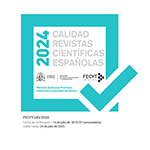Emotional well-being as a predictor of quality of life in senior co-housing
Abstract
After an analysis of older people from a contemporary perspective, this study proposes co-housing as an alternative way of life to traditional senior residential homes. This form of co-habitation is proposed for reasons including its promotion of a better quality of life, with the latter conceived as a multidimensional concept that depends on the interaction of personal factors and environment. This definition is broadly agreed and quality of life is measured using various indicators, including emotional wellbeing. This paper analyses the aforementioned dimension in depth. It is shown that trust in one’s own abilities, stability and emotional state are key determinants in the overall assessment of quality of life. A comparison is performed between two residential models for older people in this context: traditional residential homes in which a care-based system is applied, and co-housing, a model in which symmetrical and nonhierarchical relationships are established where users are also active managers of their co-habitation model.
Downloads
Article download
License
In order to support the global exchange of knowledge, the journal Cuadernos de Trabajo Social is allowing unrestricted access to its content as from its publication in this electronic edition, and as such it is an open-access journal. The originals published in this journal are the property of the Complutense University of Madrid and any reproduction thereof in full or in part must cite the source. All content is distributed under a Creative Commons Attribution 4.0 use and distribution licence (CC BY 4.0). This circumstance must be expressly stated in these terms where necessary. You can view the summary and the complete legal text of the licence.









